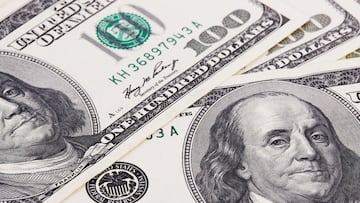SNAP benefits in Florida: Who will get the electronic transfer before the end of April?
Disbursement of April SNAP benefits continues in Florida. With less than a week to go, we explain who will receive their money before the end of the month.

Every month, every state in the country sends out Supplemental Nutrition Assistance Program (SNAP) benefits, formerly known as food stamps.
Despite being a federal program, each state administers its own payments. In the case of Florida, these are managed by the Office of Economic Self-Sufficiency (ESS), of the Florida Department of Children and Families (DCF).
Beneficiaries receive their money on an electronic benefit transfer (EBT) card, which works like a debit card to purchase food at authorized establishments.
In Florida, payments are sent from the first day of each month until the 28th, so before the month ends, several beneficiaries will receive their money. Here all the details.
These people will receive their SNAP benefits in Florida before the end of the month
SNAP benefits are deposited onto EBT cards by 6:00 a.m. from the 1st to the 28th of each month, according to the digits 9 and 8 of your Florida case number (read backwards).
The ESS takes the ninth digit followed by the eighth digit of a person's case number to create a two-digit number, which corresponds to the day someone receives their benefits. If a recipient's ninth digit is 9 and their eighth digit is 8, then the number in this formula would be 98.
You can find your case number by reviewing the benefits approval letter sent to you by the Department of Children and Families (DCF). This is the payment schedule:
- 00-03: April 1
- 04-06: April 2
- 07-10: April 3
- 11-13: April 4
- 14-17: April 5
- 18-20: April 6
- 21-24: April 7
- 25-27: April 8
- 28-31: April 9
- 32-34: April 10
- 35-38: April 11
- 39-41: April 12
- 42-45: April 13
- 46-48: April 14
- 49-53: April 15
- 54-57: April 16
- 58-60: April 17
- 61-64: April 18
- 65-67: April 19
- 68-71: April 20
- 72-74: April 21
- 75-78: April 22
- 79-81: April 23
- 82-85: April 24
- 86-88: April 25
- 89-92: April 26
- 93-95: April 27
- 96-99: April 28
Therefore,those people with numbers between 86 and 99 will receive their payment before the end of April.
You may be interested in: Amazon home food delivery for SNAP beneficiaries: this is how it works and price
How much money is sent to SNAP beneficiaries in Florida?
Amounts sent depend on household size, as well as other income factors and other requirements. In Florida, the average payment is $180 per person.These are the maximum amounts awarded in the state, which are in effect until the end of September:
- 1 household member: $291 dollars
- 2 members: $535
- 3 members: $766
- 4 members: $973
- 5 members: $1,155
- 6 members: $1,386
- 7 members: $1,532
- 8 members: $1.1751
- Additional member: +$219
At these Florida establishments you can use the EBT card
These are the supermarkets that accept the purchase of items with the EBT card in Florida, according to the Food and Nutrition Service.
- ALDI
- Amazon
- BJs Wholesale Club
- Earth Fare
- Freshfields Farm
- Greer's Cash Saver
- Hitchcock's Markets
- JC's Market and Food Kitchen
- Milam’s Markets
- Mt. Plymouth Grocery
- Publix
- Sam's Club Scan and Go
- Sprouts Farmers Market
- Target
- Walmart
- Whole Foods
The EBT card can be used only to purchase certain foods at any location that accepts SNAP benefits or food stamps. Allowed foods include: fruits and vegetables, meat, poultry and fish, produce dairy products, breads and cereals, other foods such as snacks and non-alcoholic drinks, as well as seeds and plants.
On the other hand, recipients cannot use the EBT card to purchase beer, wine, liquor, cigarettes or tobacco, vitamins, medications and supplements, hot foods, or any non-food items, such as cleaning supplies and hygiene items.





